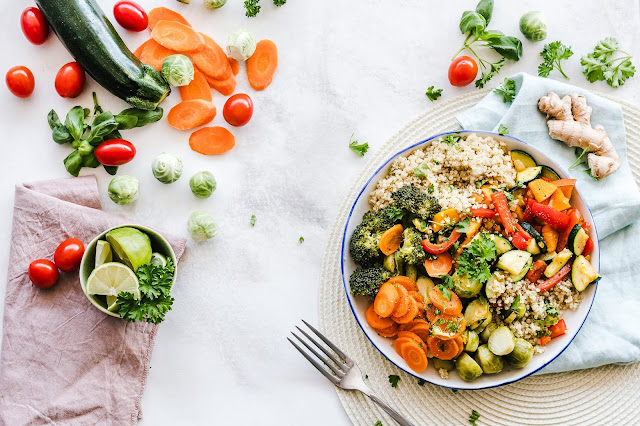How To Make More Healthy Eating By Doing Less
Achieve a healthy eating pattern by making smart choices in choosing food and beverages. A nutritional diet is the best thing you need to keep your health on track as you age. Eating healthy has long-term benefits to prevent health conditions such as heart disease, stroke, diabetes, and obesity. A person with a disability, or if you're on any medication, healthy eating habits support the medication process.
Is healthy eating important?
A healthy, nutritious, and well-balanced diet with physical activity is the foundation for good health. Healthy eating promotes optimal body weight and prevents serious diseases. High-quality proteins, carbohydrates, healthy fats, vitamins, minerals, and water included foods are the right example for healthy eating.
Limit These Nutrients in Food for Healthy Eating
Here is the list of some nutrients that cause weight gain and are unhealthy for the heart. Make sure to minimize their usage in your food.
Sodium
Sodium is a mineral found in table salt, but we consume most of the sodium from packaged food, processed food we buy, and the food we eat at restaurants.
How to Cut Down on Sodium?
Starting cooking your own food at home puts you in control. While preparing food, remember to choose ingredients that have low sodium. You can also add herbs or spices instead of salt or buy fresh food instead of packed food.
Added Sugars
Manufacturer companies use syrups and sweeteners in sodas, yogurts, and cereals. Limit food and drinks that are high in sugar. Consuming excessive added sugar makes it hard to stay at a healthy weight.
How to Cut Down on Added Sugars?
Check labels of food while buying. Buy low-sugar products to take control of the consumption of added sugar to less than 50 grams in a day.
Saturated Fat
Limit saturated fats and replace them with unsaturated fats to protect your heart. It comes from animal products like dairy, meat, and poultry.
How to Control Saturated Fat?
Foods that are part of a healthy eating routine also have some amount of saturated fats. Aim to limit the consumption to less than 20 grams a day. Choose low-fat animal products or replace them with unsaturated fat that will help to lower LDL cholesterol and prevent the risk of heart diseases.
Tips to Healthy Eating
Don't know from where you start? Let me tell you a small change can make a big impact when we talk about healthy eating. Start finding a healthy substitute for food you often eat. Here are some tips for healthy eating that you can start following.
- You can prefer to eat the whole orange rather than drinking orange juice.
- Do you like to eat pasta? Go with whole wheat pasta.
- Start adding more vegetables to your food. Add chopped vegetables to casseroles, soups, or even baked goods.
- Go with low-sodium soups and sauces.
- Choose to eat lean cuts of meat like skinless chicken breast or fish for protein. You can even try non-meat substitutes such as beans or nuts.
- Don't drink soft drinks or other sweetened beverages. Replace those with unsweetened sparkling water, milk, or coffee.
Eating Healthy to Lose Weight
Let's face it you would find an overwhelming amount of information online on how you can lose weight quickly and get in shape. Also, find many restrictive diets and meal plans to lose weight, but the problem is they result in short-term weight loss.
- Following these diets to lose weight is unhealthy and unsustainable. You can follow these tips on eating healthy to lose weight that might be a healthier way to lose weight.
- First of all, let's understand this eating a healthy diet is one thing, but losing weight depends on how many calories you take in and the calories you burn in return.
- Eating healthy to lose weight requires fiber-rich food like vegetables, fruits, beans, and whole grains. Eating more fiber-rich foods can help to lose weight.
- Consuming sugary drinks is the main reason for unhealthy weight gain. Foods with added sugar are very profound in nutrients body needs and cause health conditions such as heart diseases and diabetes. An individual who follows eating healthy to lose weight can eliminate high-sugar food products from eating regimes.
- Eat food with low calories, so you can make a balance by eating fewer calories than you burn.
Will Eating Healthy Help Lose Weight?
Some people ask this question more often. As we talk about this above, it is a balance between the calories you take in and the calories you burn. Ensure you're eating a healthy diet with low calories and burn off more than you take in to lose weight.
Eating healthy helps lose weight when you add any physical activity with it. To burn more calories exercising is necessary. A diet alone will not help to lose weight. A combination of eating healthy, exercising, staying hydrated, and getting enough sleep will help to keep your heart strong, build muscles, and decrease the risk of some serious diseases.
Follow an Eating Schedule to Lose Weight
Eating healthy is necessary, but eating at a time will take you one step closer to your weight loss goals. People who stick to their eating plans and get regular exercise got successful in long-term weight management.
Eating Healthy on a Budget
Because of the pandemic situation, many people lost their jobs, home, and income sources. It makes challenges to eating healthy on a budget. Nutritional food costs are higher which is another obstacle to eating a well-balanced diet when you're on a tight budget. Follow these tips for eating healthy on a budget to be healthy and save some of your money.
- Prepare your own meal.
- Spend your money on fiber-rich foods like vegetables, fruits, grain foods, lean meat, beans, nuts, milk, and yogurt.
- Prepare a list of what to buy, when, or how much, and stick to it.
- Plan your meals.
- Drink water instead of spending money on sweetened drinks.
- Freeze leftovers for other meals.
- Only spend money on what you need.
- Shop for pulses or beans that are low in calories and fat but packed with nutrition(Fiber, minerals, and vitamins).
- Look for recipes to prepare a meal from leftover or a healthy meal using fewer ingredients.










Comments
Post a Comment